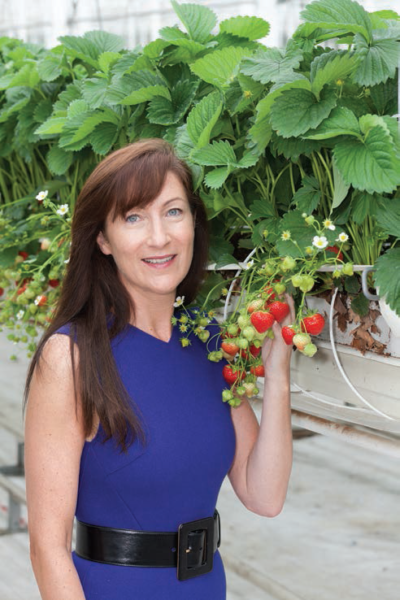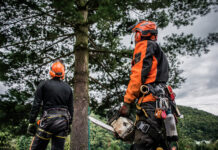Barry Lupton interviews Caroline Keeling
CAN YOU OUTLINE YOUR TYPICAL WORKING DAY?
There’s no typical working day. I could get up any time from four in the morning to seven in the morning, depending on what’s happening in the day and where I’m going. I could get home any time from six in the evening to twelve at night to not getting home at all. Days are extremely varied, which I enjoy but will usually involve multiple meetings with customers and colleagues. It’s a busy and very well-planned life. I am usually booked ahead for three months!
It presents the challenges of course. The main one ensuring that I have time with my son. Once I have that everything else is fine.
WAS IT ALWAYS YOUR PLAN TO BECOME CEO? IF NOT, WHAT DID YOU ENVISAGE DOING GROWING UP?
No, I didn’t plan to be a CEO. When I was a kid, I probably didn’t even know what that was and back then there weren’t too many women running businesses. I think I wanted to be – for no good reason – a historian, a PE teacher and a nun. I recall my mum saying that I wouldn’t enjoy being a nun because I couldn’t start as mother superior. She spotted it when I didn’t.
YOUR BUSINESS MOTO IS ‘BELIEVE, SUPPORT, INSPIRE’. HOW DO YOU ARTICULATE THIS IN DAY TO DAY ACTIVITIES?
I think it’s important in the business to believe in what you’re doing, and what you’re trying to do. I’m lucky to be working in a business that I love. I love our company culture of trying to get better at them all the time. So, we never sit back and relax. I think the belief is in what we do, and we have a vision of what we do. I’d put the inspire next. Inspiration is about making sure the team around us to deliver, that they understand us, believe in us and share our vision. If you inspire someone you also must support them. Modern business can be difficult, and it is vital that we have the right supports in place. To achieve potential, people need the right training, the right tools and the right information at the right time.
WHAT MOTIVATES AND INSPIRES YOU TO WORK AS HARD AS YOU DO?
I think something in me really hates doing a bad job, and it convinces me to push on to do the best I can. On a day to day basis, the main thing that motivates me is the people within our business. They inspire me to do better and to strive for more. We drive each other forward.
HOW DO YOU MANAGE YOUR WORK-LIFE BALANCE?
I have a two-year-old son, so I have a real focus outside of work. He’s obsessed with my iPhone so when I’m with him it’s not with me. Hopefully, I keep this habit as he grows, I think it’s good for us both.
WHAT DO YOU VIEW AS BEING YOUR MOST SIGNIFICANT BUSINESS SUCCESS?
To be honest, I’m not good at looking at the past, but from where I sit right now, it’s creating the Keeling team. Oftentimes the CEO is singled out for achieving success but success in business is always about the team. We have done amazing things in the company and they are down to our amazing people. I’m proud of our products but much prouder of our team.
IT’S BEEN SAID THAT FAILURE IS AN IMPORTANT COMPONENT OF SUCCESS. CAN YOU GIVE SOME EXAMPLES OF THINGS THAT DIDN’T WORK FOR THE BUSINESS?
I would agree with that and we’ve certainly had a few failures along the way. In the past, we had occasions where we failed to listen carefully enough or not identifying exactly what we needed to be doing. We learned at some cost about not working with the right people. We had the right plans but the wrong people. We believe in never wasting a good crisis and use our failures to become stronger. We’ve learned to listen, to plan, to act and to move forward. We’ve learned to invest in relationships and build partnerships. I never beat myself up for hiring the wrong person, but I would if I didn’t deal with it.
YOU GROW A HUGE VOLUME OF FRESH PRODUCE. DO YOU ALSO IMPORT, AND IF SO, HOW MUCH OF YOUR TOTAL COMES FROM OTHER COUNTRIES?
Of everything we sell in Ireland, we grow about 15 to 16% of it. That’s partly because we sell a whole range of fruit such as bananas and oranges which are currently not grown in Ireland. We are doing everything to extend growing seasons for Irish products, particularly berries and cherries.
I HAVE LISTENED TO DEBATES ON WHETHER WE SHOULD BE EATING SEASONALLY OR IF IT’S OKAY TO BE BUYING YEAR-ROUND PRODUCE FLOWN IN FROM AROUND THE WORLD. I STILL CAN’T DECIDE. WHAT IS YOUR OPINION ON THE DEBATE?
I think if you can grow it locally it’s great, but I also feel that growing it at certain times is just not feasible. Berries, for instance, have become an important part of the Irish diet and it’s simply not possible to have fresh Irish product available all year round. There is a lot of research and innovation taking place in transport and I think we will see dramatic changes over the next ten years which reduce the impact of year-round supply.
IRISH HORTICULTURAL BUSINESSES ARE IN THE LARGE PART, FAMILY OWNED AND OPERATED. WHILE A FAMILY STRUCTURE CAN CONFER BENEFITS, OFTENTIMES IT HAMPERS CHANGE AND DEVELOPMENT. WHAT IS THE KEELING FAMILY SECRET TO BUSINESS SUCCESS?
We are very much a family business and we all love the business we’re in; we’re very passionate about it. That said, our success rests on our team which comprises of experts brought in from the outside but who share our passion. Our secret is our people.
MANY IRISH HORTICULTURAL COMPANIES ARE REPORTING REAL CHALLENGES IN FINDING SUITABLY SKILLED EMPLOYEES. ARE YOU FACING SIMILAR CHALLENGES, AND IF SO, HOW ARE YOU TACKLING THEM?
Yeah, it’s a huge challenge. It is something HR and our operational teams work on a lot. It’s something we measure ourselves on, particularly with seasonal workers. Frequently we get a very high level or returning workers, which is crucial to us. And the reason they return is because they are treated well. We work hard at trying to make sure that the people who come to work with us have a good experience and that they want to come back. We hold regular employee forums to make sure our staff is happy. Oftentimes it’s the small things that are important, providing the occasional special breakfast or having an ice cream van on hot days. Treating people well is very much part of our culture.
| ENERGY CONSUMPTION, WATER USE, PLASTICS, AND CHEMICALS ARE HOT BUTTON ENVIRONMENTAL ISSUES. FROM THE OUTSIDE, YOUR BUSINESS COULD APPEAR TO HAVE NEGATIVE IMPACTS IN THESE AREAS. WHAT IS YOUR PERSONAL PHILOSOPHY ON SUSTAINABLE BUSINESS PRACTICE AND HOW DOES IT ARTICULATE IN KEELING’S? We’re members of Origin Green, which we view as very important. We’ve used it to help us in our drive for sustainability. The reality is a sustainability makes good economic sense. There are challenges with taking a sustainable approach but there are quite a few supports in Ireland. One thing I am very proud of is our switch from peat to coir which we use for our berry crops. We are the first large-scale company to achieve this globally. We have also made significant inroads in replacing chemicals with natural predators. We are constantly exploring new ways to reduce environmental impacts. WHAT ARE THE MOST SIGNIFICANT CHALLENGES KEELING’S FACES OVER THE NEXT DECADE? I suppose there are several of them. I would say how we adapt, introduce and integrate technology is the most significant factor for the next decade. This is the same for most businesses. Planning for technology is very difficult. Picking the right technology at the right time is an art and a science. On the other hand, we face a battle for people. It’s a tough work environment. The produce food industry is very fast-moving. There are a lot of changes. There is a lot of pressure on people to deliver and keep delivering. We must create a sustainable, profitable and enjoyable business for people to work in. That’s no easy task.IN RECENT YEARS YOU HAVE DEVELOPED A TECHNOLOGY BUSINESS AND HAVE HAD GREAT SUCCESS SELLING IN HOUSE DEVELOPED SOFTWARE IN CHINA AND EUROPE. WHAT WAS THE CATALYST FOR DEVELOPING THIS BUSINESS? It was using it in our own business and seeing how successful it was. We had used other, bought in systems and they just didn’t deliver. We created something that worked for us, providing our decision makers with the right information at the right time. It worked for us, so it would work for others. That said, it was not easy to break into another business, but we did it. As I said, technology is going to be increasingly important, being part of that sector will help us. AUTOMATION, ALGORITHMS, AND AI ARE JUST THREE TECHNOLOGIES SHAPING MODERN BUSINESSES. HOW DO YOU SEE TECHNOLOGY SHAPING YOUR BUSINESS IN THE FUTURE? WHAT HAS BEEN YOUR EXPERIENCE OF BEING A FEMALE CEO IN WHAT HAS BEEN A TRADITIONALLY MALE DOMINATED MARKET? That said, the workplace was designed for men, because men did it, until relatively recently. And we do have to give pause, as to the reason why there’s only about five percent of CEOs that are women. And it’s not capability. So, we need to get under the skin a little bit more or the next generation will be blocked in whatever way the current is. And there are numerous reasons why there’s only five percent, but it’s most certainly not capability. IF YOU COULD WAVE A MAGIC WAND AND CHANGE SOMETHING ABOUT YOUR BUSINESS, WHAT WOULD IT BE? WHAT ADVICE WOULD YOU GIVE TO SOMEONE WISHING TO PURSUE A CAREER IN EDIBLE HORTICULTURE? |








